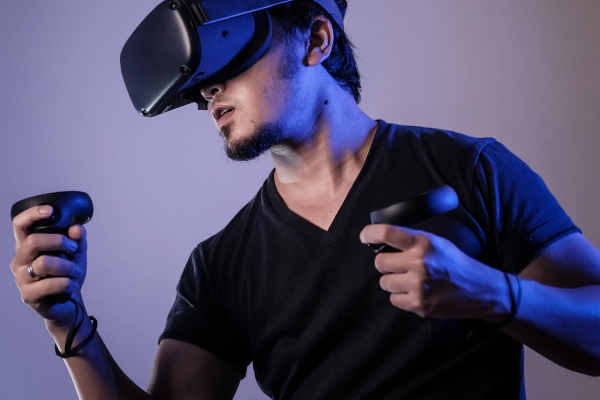By Swissquote Analysts
Microsoft Partners with Meta on the Metaverse

Last month, Meta hosted Meta Connect, an annual event devoted to augmented and virtual reality. At the event, an ambitious new virtual reality headset was unveiled: the $1,500 Quest Pro. Touted by Meta as the ‘ultimate wearable technology’, the headset meets the wants and needs of ‘metacommuters’ or people who want to work their real-life jobs in a metaverse setting.
The Quest Pro headset is an advancement on Meta’s Quest 2 headset, and comes with a price-jump of $1,100. The justification for the whopping increase is that the Quest Pro headset contains new technologies, including a mobile Snapdragon computer chip that enables the device to produce more advanced graphics.
The headset also features inward-facing sensors that capture the facial expressions and eye movements of the wearer, which are reflected in the wearer’s avatar. These elements are geared towards making a more meaningful human connection in the virtual reality landscape, helping the wearer feel that they’re physically present with others in the metaverse.
Meta’s ambitious goals are not without challenges. Widespread adoption of VR and AR headsets, particularly in the workplace may be more than 10 years off. In its current state, the technology is blamed for causing eye strain and sound disorientation, and inducing headaches, nausea and dizziness. Meta is claiming, however, that the Quest Pro’s streamlined profile and counterbalanced design allows it to be worn comfortably for longer periods of time.
In addition to the unveiling of the Quest Pro, Microsoft CEO Satya Nadella appeared to announce a partnership with Meta that would facilitate the integration of Teams, Windows and Office to the Meta Quest Pro. The benefit of this, according to Nadella, would be the ability to securely stream the entire Windows experience to a VR device.
While Microsoft has long shown interest in developing software for the metaverse, this is the first time the two companies have partnered in over a decade, in the interest of driving workplace adoption of VR and AR.
Specifically, the Microsoft-Meta partnership will entail the following:
- Microsoft Teams integration with Meta’s Oculus Quest devices for immersive virtual avatar-based meetings
- Windows 365 integration with Quest: personalised apps, content, and settings in Windows 365 will be available on Quest
- Microsoft 365 integration with Quest devices: Word, Outlook, Excel, and more will be available within the Quest VR environment
- Microsoft Intune and Azure Active Directory integration with Quest devices (Quest Pro and Quest 2) for device management and security under Quest for Business subscription.
